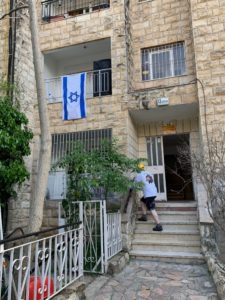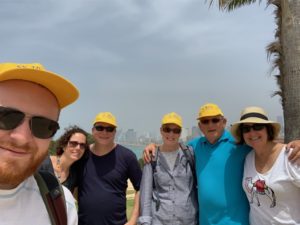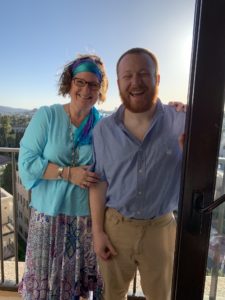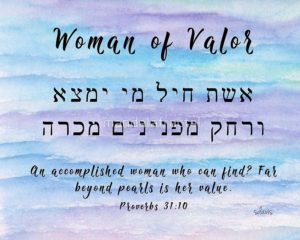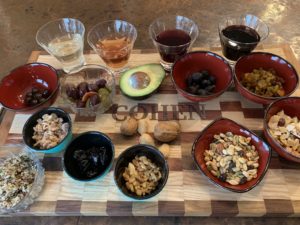The Sounding of the Shofar Awakens The Soul
One of the highlights of the high holidays is to hear the shofar.
The shofar, a hollowed out ram’s horn, is the most ancient musical instrument used throughout history as a rallying call to bring people together. In ancient Israel, the shofar announced the New Moon (Rosh Chodesh), was blown in the desert as a battle cry to declare war and celebrate victories, was blasted on Mount Sinai when the Jewish people received the Ten Commandments, and the Hebrew tribe Levites of the Holy Temple played the shofar as one of their musical instruments.
In modern times, the shofar most commonly blown like a trumpet to signal the coming of the New Year—Rosh Hashanah—and to awaken our souls and bring us closer to God.
Traditionally, the most common place to hear the shofar is in synagogue, but this year because of covid19, many of us will hear the blast of the shofar outdoors, in a park, on a neighborhood street, in our backyard, or virtually on a computer. Continue reading
Dreaming of Coronavirus and Casseroles Keep Me Up At Night
 Two main things keep me up at night. First and foremost, the health and safety of my family. Secondly, what to make for dinner. Also, hot flashes. So technically that’s three things that keep me tossing and turning in bed while everyone else is sleeping. Continue reading
Two main things keep me up at night. First and foremost, the health and safety of my family. Secondly, what to make for dinner. Also, hot flashes. So technically that’s three things that keep me tossing and turning in bed while everyone else is sleeping. Continue reading
Tisha B’Av, A Time To Rebuild Our Inner Sanctuary
If ever there is an appropriate time for communal mourning, it is now, in the midst of a global pandemic. On July 29 at sundown marks the saddest day of the Jewish calendar, Tisha B’Av, which commemorates the many catastrophes that have befallen the Jewish people at this very time throughout our history.
Tisha B’Av is not a holiday of joy, but rather an anticipation of better days to come. This perspective sheds light and gives us hope in our modern day tragedy. Pandemic, protests, politics…we are in a war amongst ourselves.
Tisha B’Av, which literally means the ninth of the Hebrew month of Av, is a time to remember the destruction of the two holy temples in Jerusalem almost 2,000 and 2,500 years ago, as well as other calamities that sought to break our soul and destroy us. We remember these tragic events that include the expulsion of the Jews from Spain in 1942, the start of World War I and the ensuing tragedy of both Worlds Wars that lead to the Holocaust, and more HERE.
The exile lasted up until the Six Day War in 1967 when, after a battle, the Western Wall became ours again. Today, the world is under siege by the fallout of COVID-19. The novel coronavirus continues to wreak havoc on humanity on all fronts–physically, emotionally, economically, socially, morally, and ethically. We were not prepared for this causing much pain, suffering, fear and uncertainty. And tragically, we are our own worst enemy. Continue reading
Counting Upward, The Spiritual Journey to Shavuot
Shavuot, a Jewish holiday that celebrates the revelation of the Torah on Mount Sinai, is around the corner but Jews have been diligently preparing for this moment since the second night of Passover.
The word Shavuot (or Shavuos) means “weeks,” and the Torah invites us on a seven-week, soul- searching journey known as Sefirat HaOmer–that’s when we count up to the days of Omer. This 49-day time period is meant to be a workout of the human psyche so that our soul is in better shape to receive the vast wisdom in the Torah that was entrusted to us by God. We count up–not down–because each day we ascend to a level higher of spiritual refinement, each day we take one step closer to becoming God’s chosen nation. Living in a Covid pandemic world right now, we are doing a lot of counting. We are counting 100,000 American lives lost to this virus that we didn’t even know existed a year ago. We count days in quarentine, days until another part of the economy reopens. During this time, more than anything,  we are reminded that  every day counts, every person counts, every act of kindness counts, every growing pain counts, and, every blessing counts.
Chag Sameach–It’s Yom Yerushalyim, Jerusalem Day!
As Jewish people all over the world come together (virtually) for Yom Yerushalayim, Jerusalem Day, I reflect on where I was at this time last year. And that was the City of Gold, visiting my son who lived in Israel while teaching English to Israeli children in middle school.
And now, a year later, Israel is just starting to reopen after quarantining for several months because of coronavirus. I may live thousands of miles away in St. Louis, but like many Jews I always feel connected and at home in Israel.
Eishet Chayil, “Woman of Valor,†The Ultimate Mother’s Day Poem
This Mother’s Day is unusual—every day is unusual—because the covid pandemic continues to separate many of us from our loved ones. For many families, their mothers and children are apart, and social distance parties and Zoom meetings are the next best thing to actually being together physically. This Mother’s Day, I will be celebrating with my husband and our son Jack, who promised to whip up something creative for dinner, maybe a ginger cocktail, deviled egg appetizer, squash salad, and some kind of chicken drizzled with a tzatziki sauce that is all plated like a fine Mediterranean restaurant. I will be missing our younger daughter Sari who is away at pharmacy school studying for finals.
On this Mother’s Day, I am beyond grateful that I am healthy and so is my family, so truly this is the greatest gift of all.  All I ask for, besides a little adulation for holding down the fort during these last two months of quarantine, is a lilac bush planted in the backyard so I can inhale the sweet fragrance with every gentle breeze.
On every Friday night, when we welcome the Sabbath Queen, we have an opportunity to celebrate Mom every singe week–it’s called Eishet Chayil (pronounced aish-et chai-eel or eishes chayil), translated to “Woman of Valor,” and this poem written thousands of years ago by King Solomon pays homage to the matriach of the family like no other words can. Continue reading
From Mourning To Celebration, Israel Teaches Us Resilience
During these challenging times of corona, every day, every hour, is unpredictable. Sometimes fear and sadness seem to overlap with laughter and happiness, all in the same moment. Our resilience is being tested right now. Even in the darkest hour, we have faith that there will be light again. This strength is never more evident than how the Jewish people transition from Yom HaZikaron (Israel’s Memorial Day) to Yom Ha’atzmaut (Israel Independence Day), which is April 27 and 28 this year.
In the time span of a week, Israel goes from mourning the six million Jews who perished during the Holocaust (Yom HaShoah), to the next week remembering the soldiers who sacrificed their lives , Israel Memorial Day, to the very next day celebrating Israel becoming a state, Israel Independence Day,  Yom Ha’atzmaut. Typically these momentous events draw crowds of people, but during the pandemic lockdown the many ceremonies took place in empty venues and were broadcast online, allowing the world to witness how a nation comes together in solitude in the worst and best of times. This trajectory of lows and highs, our ability to adapt and to never give up, has led to the survival of the Jewish people. And this is the kind of strength that we all need to embrace during the global health crisis. Â
After Darkness, There is Light. A Lesson When The Pandemic “Passes Over”
 “Why is this night different from all other nights,†will begin my 25-year-old son Jack sporting a thick, shaggy red beard, looking more like Rabbi Yankel. The last time he recited the Mah Nishtanah, the Four Questions, at our seder he was probably around bar mitzvah age. This Passover is different, in so many ways.
“Why is this night different from all other nights,†will begin my 25-year-old son Jack sporting a thick, shaggy red beard, looking more like Rabbi Yankel. The last time he recited the Mah Nishtanah, the Four Questions, at our seder he was probably around bar mitzvah age. This Passover is different, in so many ways.
Tonight, there are only three of us at the table.  My 21-year-old daughter Sari is away, living in her college town in Kansas while taking online classes and working in a local pharmacy in the thick of a pandemic. Even though I wrote an article on virtual seders HERE, and have learned some clever ways to social distance during a real life Passover plague, we chose to do our own service this year, just the three of us. I have a collection of Haggadahs, poems, and passages that we can use, and of course I prepared a full course meal, from matzo ball soup to chocolate macaroons. Hoping Sari will join us for the afikomen, at least.




